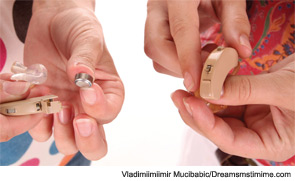
Explore This Issue
February 2012MIAMI BEACH — More and more options are emerging to help patients improve their hearing, a group of aural rehabilitation panelists said here on Jan. 27 at the Triological Society Combined Sections Meeting.
Hearing loss is the third most common chronic health care issue in the U.S., a fact that is “just amazing to me,” said moderator Jennifer Derebery, MD, clinical professor of otolaryngology at the University of Southern California School of Medicine and a neurotologist associate at House Ear Clinic in Los Angeles.
“We all know that the workhorse treatment of hearing loss is the hearing aid, and yet the prevalence of individuals who need hearing aids and actually obtain them has been flat for decades,” she said.
Six million people over 55—just a fraction of those who could benefit from one—have a hearing aid, with just 5 million of them actually using it. Of those, 2.5 million patients are unhappy with their hearing aids, Dr. Derebery noted during her presentation.
Improvements
Samuel Selesnick, MD, FACS, professor and vice chairman of otolaryngology-head and neck surgery at Weill Cornell Medical College in New York City, said hearing aids are improving.
The “open fit slim tube” found in some hearing aids reduces the occluding of the canal, making them comfortable and more cosmetically appealing. There are models that reduce feedback, allowing for improved hearing of speech in noisy settings, directional microphones that allow the listener to direct the device; for example, in front of them where the person talking is likely to be; and devices allowing listeners to better determine the origin of sounds.
Cell phones have come into the mix as well, acting as a hearing aid remote control with volume and channel control and even acting as a remote microphone with bluetooth technology, able to be placed, for instance, in the middle of a table during a meeting.
But Dr. Selesnick said a focus on technology might not be what’s best for patients. “One might argue that the entire high-tech issue is really of relatively minor importance when compared to the counseling and rehabilitative aspect,” he said. “Instead of the center of the model being technology it really should be a person-centered model, with technology being one important part.”
He said this is made difficult by lack of compensation to providers to spend more time with patients and a limited availability of qualified providers with the right “passion and skill set.”
Implantable Devices
Herman Jenkins, MD, professor and chair of otolaryngology at the University of Colorado School of Medicine in Denver, said that while implantable devices for the middle ear are promising, challenges remain, particularly with creating a battery that is compact and has a long life span.
Leave a Reply